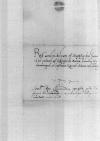List #1322
Sigismund I Jagiellon do Ioannes DANTISCUS & Georg von BAYSEN (BAŻYŃSKI)Vilnius, 1535-06-13
| odebrano 1535-06-23 Rękopiśmienne podstawy źródłowe:
Publikacje:
| ||||||
Tekst + aparat krytyczny + komentarzZwykły tekstTekst + komentarzTekst + aparat krytyczny
Reverendo in Christo Patri et Magnifico Domino
Reverende in Christo Pater et Magnifice, sincere nobis dilecti.
Magnopere gratum nobis fecistis, quod in referendis et exsequendis mandatis nostris apud
Bene valeant Sinceritates Vestrae.
Ad mandatum sacrae regiae maiestatis proprium


 BNW, BOZ 953, f. 133v
BNW, BOZ 953, f. 133v